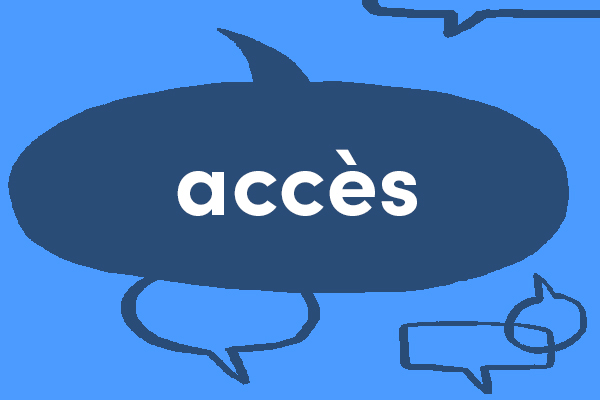Our French word of the week for this week is accès. You can listen to the pronunciation of accès in the audio clip below:
Accès is a masculine noun which shares its main meaning with a very similar-looking English word, access. It can also mean entrance or entry. We can work out the gender of a noun in different ways, like looking at its indefinite or definite article – le or un are the masculine forms. But because accès starts with a vowel, it becomes l’accès and we cannot tell from its definite article. For more about this, see our Easy Learning Grammar page on working out the gender of French nouns.
Let’s look at some examples of how we use accès:
Cette porte donne accès à la salle à manger. The door gives access to the living room.
Il avait accès auprès du ministre. He had access to the minister.
avoir accès à Internet to have access to the Internet / to have Internet access
une rampe d’accès access ramp (for wheelchairs)
code d’accès access code
L’accès principal à la gare routière est fermé le soir. The main entrance to the bus station is closed at night.
accès interdit no entry
Note that in certain phrases or sentences, the noun accès may be translated using an adjective or phrase instead. It may even appear to be missing from some English translations – for example:
un endroit d’accès facile an easily accessible location
Le parking est d’un accès malaisé. The car park is not easy to get to.
fournisseur d’accès à Internet Internet service provider (literally “provider of Internet access”)
accès aux quais to the platforms (common train station signage)
The word accès has another couple of common, related meanings in French. When used in a medical context, it can refer to a sudden episode of illness:
un accès de fièvre a bout of fever
un accès de toux a coughing fit
un accès de vertige a dizzy spell
More figuratively, it can refer to a moment of strong emotion:
un accès de colère an angry outburst
un accès de joie a rush of joy
un accès de remords a pang of remorse
Earlier we learnt about how the vowel can make it harder to work out the noun gender – there are some similar difficulties for accès in its plural form. In English we’d say accesses, but the French word already ends with the letter S, so there’s no change for its plural. Keep an eye out for adjectival agreement in the plural form, as well as the articles les or des. Read more in our grammar section about making nouns into plurals.
Remember too that, unlike English, accès is used only as a noun in French. We can use access as a noun and we can also say to access as a verb. If you wanted to say to access in French, you’d need to use another verb that sounds a bit similar – accéder.
We hope this series of blogs will give our readers further access to some of the words from our French dictionary – come back next week to find out what our next French word of the week will be!
Written by Gina Macleod, language content editor, and Holly Tarbet, freelance copywriter and editor.
All opinions expressed on this blog are those of the individual writers, and do not necessarily reflect the opinions or policies of Collins, or its parent company, HarperCollins.




collins_dictionary_official
The home of living language. #wotd #wordlovers #collinsdictionary
Read our word of the week definitions and blog posts: